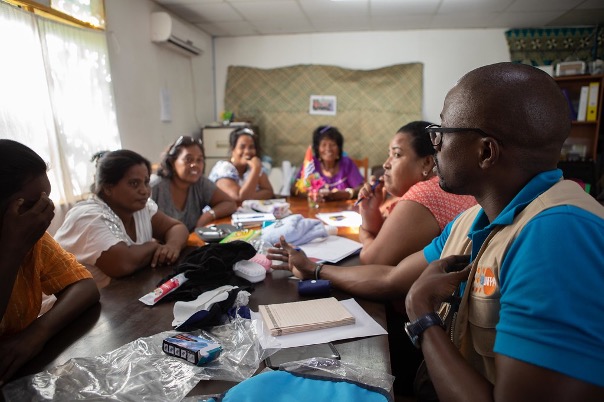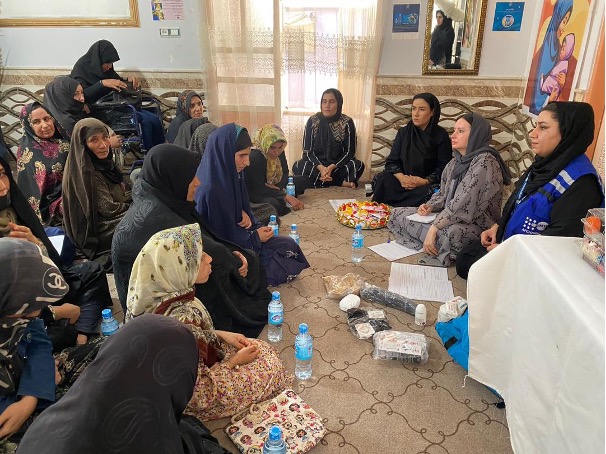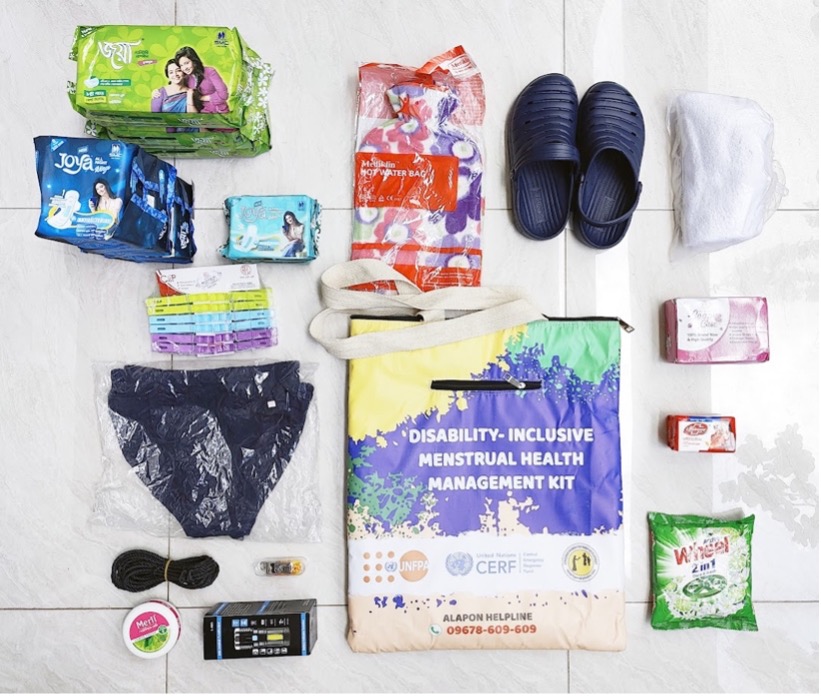Restoring Dignity: Crafting Inclusive Humanitarian Support in the Asia-Pacific
Restoring Dignity: Crafting Inclusive Humanitarian Support in the Asia-Pacific
The Asia-Pacific faces increasingly frequent and severe humanitarian crises. During these emergencies, women and girls, especially those with disabilities, are among the most vulnerable. Disasters force them to (over)crowded shelters that are often not easily accessible, nor safe. Many women and girls experience gender-based violence (GBV) and often cannot access lifesaving health and protection services. Persons with disabilities also face discrimination and mobility issues that impact other areas (e.g. managing menstrual health in small or inaccessible washrooms), compromising their dignity and physical and mental wellbeing.
UNFPA’s Dignity Kits and Menstrual Health Management Kits are a critical element of the humanitarian response, providing age, gender, and culturally appropriate hygiene items, garments and other products such as torches or whistles. Moreover, the Dignity Kits contain information leaflets on available SRH and GBV response services, thereby restoring dignity and empowering women and girls to manage their safety, health, and hygiene.
Ensuring True Inclusivity: The Imperative of Consulting Persons with Disabilities
Existing Dignity Kits can fall short in addressing the specific and diverse needs of women and girls with disabilities. To fill this gap, GDI Hub and UNFPA Asia and the Pacific regional office led the development of a comprehensive methodology or toolkit for conducting consultations with women and girls with disabilities to develop inclusive dignity kits. Actively involving persons with disabilities in the design process ensures that Dignity Kits are not only relevant and usable but also uphold the dignity, autonomy, and meaningful participation of persons with disabilities across humanitarian preparedness and response efforts.
By employing participatory design methods and storytelling techniques, these consultations empower participants to share feedback, co-create solutions, and identify modifications needed for Dignity Kits. The collected data has also informed the development of inclusive information, guidance, and distribution strategies.
This consultation tool was developed through piloting the methodology in Afghanistan, Bangladesh, Fiji, Indonesia and Sri Lanka. With the support from UNFPA country offices and UNFPA Pacific Sub-Regional Office, these countries collectively spoke to 240 people, including representatives from OPDs and women and girls with disabilities directly.


The Tool: A Roadmap for Inclusive Consultations
The tool provides a detailed outline for conducting both in-person and virtual consultations, covering participant selection, logistical considerations, data collection methods, and structured activities for each session. The tool can support organisations in designing consultations through focus group discussions and in-depth key informant interviews.
Each consultation session is structured into three key phases: (1) Introduction, collation of experiences and opinions; (2) Identifying needs; and (3) Ideation of designing/proposing solutions to identified challenges and needs. Throughout the development of the tool, the needs and lived experiences of people with disabilities were centred. The guidance document offers a variety of methodologies, including storytelling, scenario setting, and direct interaction with the dignity item materials, allowing for a high degree of customisation and interaction.
The tool provides considerations to moderators and organisers on how to ensure a safe (e.g. are participants free and comfortable to share their honest experiences), inclusive (e.g. is the mode of communication and the venue accessible) and conducive environment (e.g. are moderators able to manage sensitive topics or moments during the consultation).
Ground Truths: Challenges from the Frontline
Piloting the methodology in Afghanistan, Bangladesh, Fiji, Indonesia, and Sri Lanka provided rich insights as to the usefulness and impact of the tool. The results showed a clear picture of systemic challenges around the inclusivity of the Dignity Kit.
Across all five countries, key findings were:
- Accessibility: Physical barriers (e.g., inaccessible buildings, lack of transport, or financial means to arrange transport), distance to the distribution sites, and societal stigma exclude women with disabilities from essential services. Solutions include wheelchair-accessible sites, mobile units, door-to-door delivery, and ensuring all people involved, including family and service providers, treat persons with disabilities respectfully and empathetically.
- Planning: Inclusion of OPDs and women with disabilities in decision-making, outreach, and feedback loops is essential and still requires substantive improvements. Better feedback and accountability frameworks are key to achieving this.
- Dignity Kit content: women and girls would like increased quantities of sanitary products, and ask for more accessible packaging (e.g. bags instead of plastic buckets, liquid soap with dispenser rather than bar soap). Many requested additional products, such as adult diapers, assistive devices (e.g., crutches), adaptive hygiene tools, hygiene enhancers (e.g., wipes, masks), and cash/voucher options allowing women and girls to purchase products according to their specialised needs.
- Information materials: Should be available in more inclusive formats (e.g., Braille, audio) and not use jargon, as it hinders comprehension. Solutions include large print, QR codes, pictorial guides, sign language videos, and multilingual, simplified content.

Many of the country offices have already implemented these recommendations, from amending the kit content to the container in which the kit is disseminated. Some have even committed to providing some assistive products if they are required and have procured them in anticipation of need.
The consultations also revealed that many disabled women and girls face confinement, stigma, discrimination, and backlash at every step of the way. Fostering inclusivity, therefore, requires a whole-of-society approach, with continuous awareness campaigns and engagement with OPDs, community leaders, schools, and government officials.
Finally, the consultations shed light on the mental health challenges faced by disabled women and girls, exacerbated during emergencies. Accessible mental health and psychosocial support services are desperately needed. Ultimately, more community-based education programs on menstrual health, self-care, and GBV prevention, tailored to persons with disabilities and involving their families and communities, are essential to break down stigma and empower them to benefit fully from assistance and services.
Conclusion and next steps
The collaboration between UNFPA’s Asia-Pacific Regional Office, the Global Disability Innovation Hub, and UNFPA Country Offices in Afghanistan, Bangladesh, Indonesia, Sri Lanka, and the Pacific Sub-Regional Office in Fiji has yielded more than just a robust consultation tool - it has generated critical insights into making Dignity Kits truly inclusive for persons with disabilities.
Central to this work is the recognition that people with disabilities, especially women and girls, must not only be consulted but also empowered to shape the decisions that affect their lives. Upholding their voice, agency, and power is not just good practice - it is a matter of rights, dignity, and effective humanitarian action. We all have a duty to create space for leadership, co-design, and accountability led by persons with disabilities themselves.
These findings can inspire and guide humanitarian actors, agencies, and partners to design responses that leave no one behind, ensuring women and girls with disabilities can access the services and dignity they deserve before, during, and after crises.